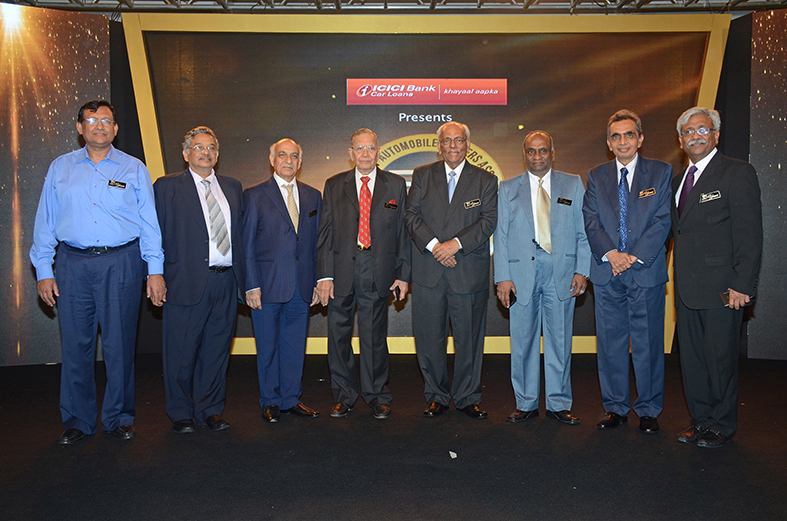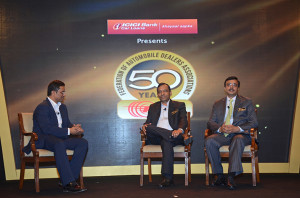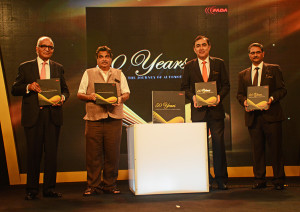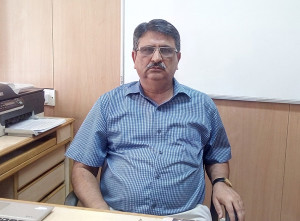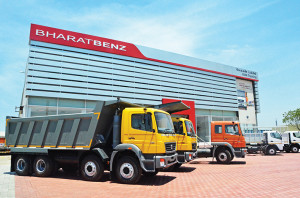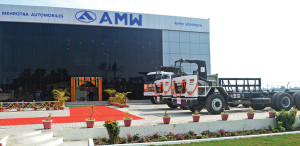‘A bright future awaits the auto sector in India’ this was the message that emerged resoundingly at FADA’s Golden Jubilee celebrations function held in Mumbai on April 17.
Kicking off and setting the tone for the power-packed, day-long programme, Mr. K.V.S. Prakash Rao, FADA President, said eloquently: “We, in the automobile dealer fraternity, have gathered here to celebrate the Golden Jubilee and cherish ‘Golden Moments’ in the history of FADA. However, the Golden Age is before us and not behind us.”
The event gave an opportunity to thank and salute the pioneers and game changers in the automotive sector, including doyens of the auto industry and auto retail business. The occasion also provided a crystal ball gazing into the future of the auto retail. The release of Coffee Table Book tracking the landmarks in the history of the auto sector, Informal discussion by industry leaders reflecting on the past, present and future of auto sector and Automotive Dealership Excellence Awards for the year 2014 (ADEA 2014) were the special features of the event.
Speaking as the chief guest on the occasion, Mr. Nitin Gadkari, Union Minister of Road Transport & Highways, said that the auto sector is the mainstay of the Indian economy. In addition to making a significant contribution to the economy, the sector also helped in employment generation. He expressed the view that the growth of the auto industry posed new challenges of pollution, road safety and infrastructure. In this context, he referred to the recent National Green Tribunal orders banning 15-year-old petrol vehicles and 10-year-old diesel vehicles from plying in NCR. He exhorted the auto industry to work proactively, in keeping with the advancements in technology, to ensure safe motoring and clean environment. The bio-gas, bio-diesel and electric vehicles would have to be adopted in a big way to reduce CO2 emissions.
Regarding the road infrastructure, the Minister gave the assurance that the present government remains committed to fast-tracking road building, which would touch 30 km a day by next year from the current pace of 12 km a day. Advocating water recycling for reuse, he pointed out that the Government is working with a sense of urgency to promote inland and coastal waterways as mode of transport. This would significantly reduce the transportation cost, accidents and pollution.
Mr. R.C. Bhargava, Chairman, Maruti Suzuki India, who was the Guest of Honour on the occasion, emphasized the importance of the role played by automobile dealers in the growth and development of the auto sector in India, saying that no OEM would succeed unless both OEMs and their dealers worked together in partnership. The auto sector is a shining example of ‘Make in India’, contributing significantly to the manufacturing GDP of the country.
Mr. Vinod K. Dasari, SIAM Vice President and Managing Director, Ashok Leyland, while congratulating FADA stressed the significance of the manufacturer-dealer relationship, saying that the dealers helped in building and strengthening customer relations through their after-sales services. The dealer network is indeed the soul of the auto sector and economy.
Talking about the future scenario, Mr. Dasari observed that the next five years would see major changes in technology, especially in passenger and commercial vehicles, engines, emission norms, crash protection, enhancement performance and comfort. Going forward, OEMs would increasingly be dependent on dealers for their inputs in bringing out new vehicles, suiting the ever-changing needs of the customers.
Dr. Pawan Goenka, President & Executive Director, Automotive Sector & Farm Equipment, Mahindra & Mahindra, said that customization would be the key to success in the times to come and that the dealers would have to play a major role in delivering customized products. In spite of digitalization and invasion of the internet, dealerships would continue to play an important role in providing the feel and touch experience to customers.
Mr. Radhakrishna Pillai, Author and Founder-Director of the Chanakya Institute of Public Leadership (CIPL) said in his speech that the teachings and ideas of Chanakya, a great philosopher, strategist and economist in the Chitragupta era, were still relevant in today’s business world. A business strategy required out-of-box thinking and creating value for the customers. The best way to manage business problems would be several strategic ideas propounded by Chanakya.
Congratulating FADA on its Golden Jubilee, Mr. Rajeev Sabharwal, Executive Director, ICICI Bank, said that with fuel prices benign, inflation and interest rates down and the rupee showing stability, the outlook for the future is rosy indeed. His bank would not only continue partnering with automobile dealers for vehicle finance, but would be happy to meet the whole gamut of funding needs of automobile dealerships.
The occasion also recognised the pioneering work of the past Presidents of FADA, and the automobile dealerships that have been in the auto retail business for over 50 years and have stood the test of time were felicitated at the event.
Earlier, welcoming the participants, Mr. Prakash Rao expressed his gratitude to the forerunners for their endeavours in making FADA a nationally and internationally recognized body, representing the interests of automobile dealers in India. FADA, a unifying bond binding the members of the automobile dealer fraternity together since its inception has played a key role in enhancing the knowledge and equipping automobile dealers to stand up to the changing dynamics of auto retail business.
Concluding the celebrations, Mr. John K. Paul, FADA Vice President, thanked the Minister and all other guests, speakers, sponsors, Network18, members of the automobile dealer fraternity and other participants for making the event truly memorable. He agreed with the view that automobile dealerships would continue to play a significant role in customer engagement through their pre-sales, sales and post-sales services, digitalization notwithstanding.
Automobile dealership network likely to expand by 5-6% in next few years: FADA
By Avishek Banerjee
Federation of Automobile Dealers Associations (FADA), the apex national body representing automobile dealers in India, recently celebrated its Golden Jubilee. Motorindia met up with Mr. Gulshan Ahuja, Secretary General, Federation of Automobile Dealers Associations (FADA). He opined that after acute slowdown in auto market lasting over two years, some green shoots of recovery are visible, owing to improved sentiment and somewhat favourable macroeconomic factors, particularly softening of inflation and crude oil prices. He maintained that the dealership count is expected to increase by 5-6% on a sustainable basis, in tandem with the growth of auto market.
Excerpts from the interview:
FADA has just celebrated its Golden Jubilee. How has this association evolved over these years? Could you run us through its journey?
FADA started in a very modest way. It was started by four regional trade associations in the 1964. Since then it has come a long way. As the dynamics of auto retail are changing, the role of FADA is also evolving accordingly. Earlier it was a pureplay seller’s market and the dealers were essentially distributors. But now, there is intense competition in the market and the dealers cannot run the way they used to do many years back. Running and managing an automobile dealership today requires professional panache. Due to the fierce competition in the market, a lot of marketing efforts are also needed to stay afloat. FADA is already doing its bit by organising training programmes to contain costs, cutting down inventory, maximising sales and optimising workshop operations. The objective is to equip automobile dealers to stand up to the challenges arising from the changing dynamics of automotive industry. FADA has also constituted Group 20 comprising of non-competing dealers within FADA. The primary objective of constituting Group 20 is to enable non-competing dealers to exchange data and information regarding their respective dealership operations so that the best practices and systems are identified as benchmarks for replication across the dealerships. FADA has also instituted Automotive Dealership Excellence Awards to recognize and reward excellence in various areas of dealership management, as also the CSR and community welfare activities undertaken by the automobile dealers across the country.
How many dealers are registered with FADA and how many are there in the organised sector? How many are there in the CV segment?
FADA represents around 1,500 individual dealers in addition to 24 regional and city-level associations of automobile dealers. In other words, FADA represents around 85-90% of the automobile retail trade in the country. A particular dealer might be running three dealerships but is registered as a single entity. Therefore, our membership strength of 1,500 dealers in a way represents 4,500 dealers. So if we include the members of regional associations, out of 10,000 dealers, FADA represents roughly 9,000 dealers (90%) across the country. The total number of CV dealers would be 700-800 across the country. As this segment is expected to grow by about 7-8% in the next five years, the dealership count should also expand by 5-6% correspondingly.
How does FADA view the recent financial year and what are your expectations for FY 2015-16?
I would say the financial year 2014-15 was satisfactory for auto market. Although there has been a slight uptick in the sales volumes, the situation at the retail level does not really reflect the wholesale numbers which are provided by the vehicle manufacturers. There is a lot of inventory pile-up at various dealerships. We are keeping our fingers crossed and are expecting some revival in the automobile market in the new fiscal. To put it the other way, auto retail market is cautiously optimistic.
With a stable and progressive government at the centre, will there be a greater retail offtake in the coming quarters?
Yes, a forward-looking government is expected to give a big boost to automobile sales. The new government has put a massive thrust on infrastructure development which will result in burgeoning sales of commercial and OTR vehicles. We also welcome the GST implementation (by 2016) that will help the overall automotive industry to grow.
It is a known fact that one of the burning issues in our industry is the low profit margins for dealers. So when do you think this issue can be ironed out?
The average margin for PV and CV dealers is 3%. This low margin is definitely a key issue plaguing the retail automobile trade and we expect it to increase to the international level of at least 8-10%. In the short to medium term, we expect the margin to go up to 5% so that the dealerships remain commercially viable in tandem with the growth of the automotive industry. Having said that, there are other issues on which FADA has initiated a dialogue. We commissioned a study on auto retail practices of passenger vehicle OEMs in relation to their dealers. The idea is to replicate the best practices adopted by the manufacturers vis-à-vis their dealers and standardise those practices across the industry.
As OEMs are expanding their base to tier-II and tier-III cities, will there be more touchpoints that will be set up there?
Definitely, it goes without saying that as the market grows there will be an increase in the number of touchpoints there. Moreover, tier-I cities are somewhat saturated and the growth is not that rapid as in tier-II and tier-III cities. In my view, the eastern and central parts of India are the next growth destinations.
What are the other measures that you are working on to serve the interests of your members?
We were basically focussing on cost-cutting measures and optimisation of dealership operations. It includes marketing, sales and workshop activities. FADA has been actively working on streamlining the processes and improving productivity of the automobile dealerships. The focus areas of the training and development programmes being organised by FADA are, better inventory management, checks on leakages, tracking of leads, etc. Our short and medium focus is to organise a series of training and development programmes for automobile dealers all over the country. We are also working on skill-development of our dealers’ workforce. FADA would like automobile dealers to get involved in creating skillsets (for their employees). They could become delivery centres for ASDC. We are also working on international organisation of auto retailers. What we are basically doing is allying with overseas auto dealers’ associations and forming an organisation at the global level. As the Indian economy is integrated worldwide, automobile dealers in India cannot remain immune to the happenings and developments in other parts of the world. So, FADA needs to exchange information, data and practices prevailing in other countries. It is a win-win situation for the automobile dealers of all the countries. Our counterparts will also be able to derive a lot of learnings from us. In the long term scenario, FADA would also like franchise laws to come into effect into India on the lines of franchise laws prevalent in the US. There should also be a proper exit policy for automobile dealers to be put in place.
